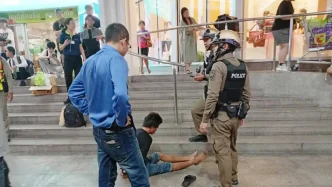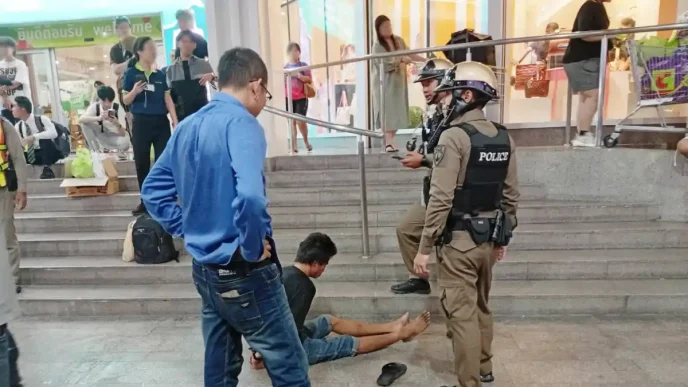In a case that highlights the precarious status of some long-term immigrants in the United States, Sonny Lasquite, a Filipino green-card holder, finds himself detained by Immigration and Customs Enforcement (ICE) over a conviction from more than a decade ago. Arrested last month upon returning from vacation, Lasquite now faces the threat of deportation, a situation that has left his family reeling and sparked broader questions about the treatment of Filipino immigrants with past criminal records.
A Sudden Detention at the Airport
Sonny Lasquite, who has lived in the United States for 23 years, was taken into custody by Customs and Border Protection (CBP) at an airport in July 2025, before being transferred to ICE. He is currently held at the Stewart Detention Center in Stewart County, Georgia. According to reports, his detention stems from a 2012 conviction related to the distribution of controlled substances. Despite having served his sentence with no additional prison time and paying a court-ordered fine of $200, Lasquite’s past has resurfaced to jeopardize his life in the US.
Lasquite’s family has publicly shared their distress over his situation. A fundraising page set up to cover his legal expenses describes him as a beloved family member and community contributor who has had no further legal issues since 2012. The page emphasizes his role as the breadwinner, caring for an elderly mother whose health has deteriorated under the stress of his detention. It also alleges medical neglect during his time in custody, citing delays in access to blood pressure medication and inadequate care for a recent fever.
As of the latest updates, the fundraising effort has collected over $13,000 to support Lasquite’s legal battle, reflecting a community desperate to keep him from being deported to the Philippines, a country he has not called home in over two decades.
A Broader Pattern of Detentions
Lasquite’s case is not an isolated incident. Other Filipino green-card holders have faced similar detentions at US airports in recent years, often due to long-resolved criminal records. Reports point to individuals like Lewelyn Dixon and Maximo Kuya Max Londonio, who were also detained upon returning from vacations abroad. These cases have raised concerns among Filipino communities in the US about the stringent application of immigration policies, even for those who have rebuilt their lives after past mistakes.
Additionally, at least three other Filipino nationals with prior convictions are currently facing deportation proceedings. These include a 29-year-old resident of Massachusetts with a rape conviction, an individual charged with terrorism-related offenses in Philadelphia, and another held at the Denver Contract Detention Facility. Rovald Valdez, an Assistance to Nationals (ATN) officer with the Philippine Consulate General in New York, confirmed that the consulate maintains regular contact with detention centers to monitor their welfare. He noted that these individuals have already served their sentences and are now being processed for removal.
Legal and Historical Context of the Case
The basis for Lasquite’s detention lies in a 2012 narcotics case, during which he was charged with possession with intent to distribute controlled substances between 2010 and 2012. Court records indicate that he took responsibility for his actions and cooperated with federal authorities by identifying co-conspirators. As a result, the court sentenced him to time served, avoiding further imprisonment. Lasquite, who worked as a banquet server in Las Vegas, appeared to have moved past this chapter of his life, living peacefully and contributing to his community for over a decade.
Under US immigration law, however, certain criminal convictions can render even long-term legal residents deportable, particularly if they involve controlled substances or other serious offenses. Green-card holders, while afforded many rights, do not have the full protections of citizenship and can face removal proceedings if flagged by immigration authorities, often during international travel when re-entering the country. This policy has been a point of contention, as it can disrupt lives built over decades in the US, separating families and uprooting individuals from their established communities.
The Filipino diaspora in the US, numbering over 4 million according to recent estimates, has been particularly affected by such policies. Many arrived as workers or family members under various visa programs, eventually securing permanent residency through green cards. Yet, for those with past convictions, the risk of detention and deportation looms large, often triggered by routine interactions with immigration officials at ports of entry.
Human Cost and Community Response
The impact of Lasquite’s detention extends beyond legal proceedings; it is deeply personal for his family and friends. Descriptions of him as a “beloved son, brother, uncle, and friend” paint a picture of a man integral to his social circle, whose absence has created a void. The added strain on his elderly mother, whose declining health has been exacerbated by the situation, underscores the emotional toll of immigration enforcement actions.
Community support has been swift, with donations pouring in to help cover legal fees. The funds are intended to secure representation that might argue for Lasquite’s release or a stay of deportation, potentially highlighting his rehabilitation, community ties, and family responsibilities as mitigating factors. Such efforts are often critical in immigration cases, where legal counsel can make the difference between remaining in the US and being forcibly returned to a country of origin.
Critics of current US immigration policies argue that detaining individuals like Lasquite, who have demonstrated reform and stability, serves little public safety purpose. Instead, it disrupts families and punishes individuals long after they have paid their debt to society. Advocacy groups within the Filipino community and beyond have called for reforms to protect long-term residents from deportation over old convictions, urging a more compassionate approach that considers individual circumstances.
Consular Support and International Dimensions
The Philippine government, through its consulate in New York, has acknowledged Lasquite’s case and others like it. Consular officials are providing assistance by monitoring the conditions of detained nationals and liaising with US authorities. However, their ability to intervene in deportation proceedings is limited, as such matters fall under US jurisdiction. The consulate’s role is primarily to ensure that detainees’ rights are respected and to offer support to families navigating the complex immigration system.
Deportation cases involving Filipino nationals also carry international implications, as they reflect broader US policies toward immigrants from specific regions. The Philippines, a key ally of the US in Southeast Asia, has historically sent large numbers of workers and families to American shores, contributing to the economy and cultural fabric. Yet, the treatment of Filipino immigrants in deportation cases can strain public perceptions of bilateral relations, particularly when long-term residents face removal over past offenses.
Looking Ahead: Policy and Personal Outcomes
As Sonny Lasquite’s legal battle unfolds, the outcome remains uncertain. His case, alongside those of other Filipino green-card holders, may fuel further debate over US immigration policies, particularly the treatment of long-term residents with historical convictions. Advocacy for policy changes, such as expanded protections for green-card holders or mechanisms to review old cases with a lens of rehabilitation, could gain traction in response to these detentions.
On a personal level, Lasquite’s family continues to rally for his release, hoping that legal representation funded by community donations can secure a favorable resolution. The broader Filipino community watches closely, aware that each case sets a precedent for how immigration enforcement might impact their own lives.
For now, Lasquite remains in detention, a stark reminder of the fragility of immigrant status even after decades of calling the US home. As his situation develops, the balance between enforcement and compassion in immigration policy will likely remain a contentious issue, both in the US and among the diaspora communities it affects.















